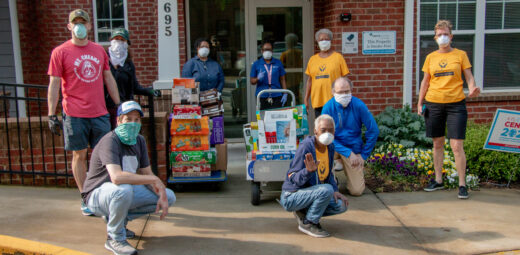
Sep 03Program-Enriched Housing Adapting to Meet the Challenge
By James Alexander, President, Mercy Housing Southeast
 Unstable, insecure, frightened are words I have heard often over the past months from family and friends. It feels we are one bad headline, week, or month, away from losing our health, job, housing, savings, or the ability to protect the ones we love. And it seems there is no clear path or timeline to escape these feelings.
Unstable, insecure, frightened are words I have heard often over the past months from family and friends. It feels we are one bad headline, week, or month, away from losing our health, job, housing, savings, or the ability to protect the ones we love. And it seems there is no clear path or timeline to escape these feelings.
Hold that feeling for a moment because for many people with low incomes, this is their state of existence, with or without the coronavirus. Granted, the current environment is orders of magnitude more challenging for many, but before the crisis, most individuals with low incomes could not manage even a small financial setback without major consequences. A $500 car repair means half the month’s rent money is gone. A prescription for a sick child eliminates several days’ food budget. That is a reality for more than 38 million Americans, many of whom are suffering additional hardships in this crisis.

In addition to providing shelter, Mercy Housing and other housing nonprofits promote stability through a ‘program-enriched housing’ approach. Onsite resident services staff offer a range of services and programs designed to foster housing stability, health and wellness, financial literacy, and academic achievement. These services promote self-sustainability, achievement, and empowerment for residents and their families.

This model has proven its resiliency by being able to turn on a dime in the face of the current pandemic due to dedicated staff onsite. We focus on two key areas, reducing food insecurity and social isolation.
First, we stocked food pantries. “I had people tell me they couldn’t feed their kids without this,” Resident Services Manager Dre Moore said, referring to the bags of groceries he and his colleagues, in masks and gloves, were handing out on a recent weekday evening. “We have seniors who shouldn’t come out of their apartments. We are taking food to them, knocking, then leaving it at their door.”
Second, we are making regular calls in the hopes of maintaining the connections that seniors need to feel that they are not alone and forgotten. For some seniors, this is the only human connection they receive all week. The calls reduce social isolation, a major risk factor for seniors. Research from the United Healthcare Foundation identified social isolation as a major impediment to the overall well-being of Americans over the age of 60. It has been found to increase the risk of depression, the worsening of chronic conditions, such as heart disease, and raise the rate of suicides among seniors.
As we enter a new phase of addressing the pandemic, we should reflect on how to come out of this crisis with practices and policies that allow all segments of our population to be more resilient and stable. We expect that service-enriched housing will be a part of the solution.
You can help! Three quick and impactful ways you can support:
- Donate to Mercy Housing.
- Learn about affordable housing initiatives in your area.
- Encourage your national, state, and local elected officials to continue support for those in need.
Live in Hope,
James Alexander
President Mercy Housing Southeast
No related posts.
Stay Up To Date
Get news on Mercy Housing and inspiring stories of change delivered to your inbox.


